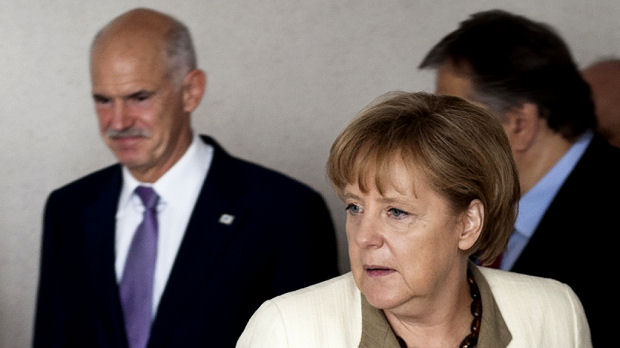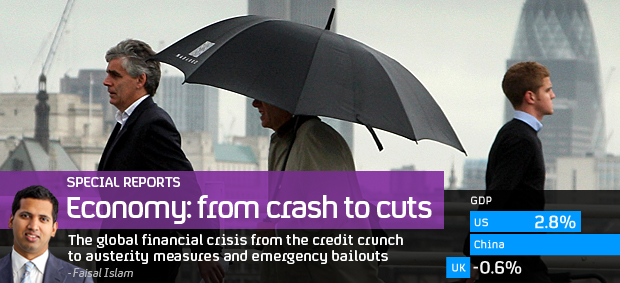Why the eurozone crisis is a political crisis
As eurozone leaders convene for an emergency meeting in Brussels, we ask: is the eurozone in trouble because there is no single authority above sovereign state level capable of controlling the euro?

With Europe’s economies on the brink, leaders of the eurozone countries are in Brussels for an emergency summit.
Their immediate task is to thrash out the details of a second bailout package to prop up the embattled Greek economy. Only last month the Greek parliament signed off on an austerity package as a precondition for the final tranche of the country’s first bailout deal.
Following so quickly on the heels of the last agreement, bailout 2.0 has revived questions about the usefulness of propping up an economy whose fundamentals are so compromised.
Today’s talks, and the negotiations that have led up to them, have also highlighted the differences between Germany and France, the eurozone’s largest economies.
We’ve gone way past the point where a rollover could fix the problems Greece faces. Graham Turner, GFC Economics
Nicolas Sarkozy, the French president, travelled to the German capital ahead of the emergency summit to ensure that he and German Chancellor Angela Merkel were united in their approach to any deal.
On Wednesday it emerged that France, which does not want Greece to default on its debt repayments, had formulated a plan to tax eurozone banks, in the process providing up to 50bn euros towards the bailout.
By the morning of the summit, however, the French plan had been jettisoned in favour of a scheme whereby owners of Greek bonds which come due within the next eight years would swap their holdings for new 30-year bonds.
Some have argued that such a scheme constitutes a de facto, albeit temporary, default. And any talk of default inevitably affects the cost of sovereign debt in relation to other large euro economies – specifically Spain and Italy.
‘Greece’s economy is unravelling’
Graham Turner of GFC Economics believes such a debt rollover would do little for Greece’s immediate outlook.
“We’ve gone way past the point where a rollover could fix the problem Greece now faces, which is that their economy is unravelling,” he told Channel 4 News.
“If they’d come out with a plan to write off the debt, then fine – but it would still have caused problems. They would still have needed a Plan B to keep funding the Greek banks.”
That view is shared by Dr Thomas Kirchmaier of Manchester Business School. He concedes that the debt rollover proposal avoids immediate default, but he warns: “If you look at the ratings agencies, they’ll probably call it a default anyway.
“The only way to de-leverage Greece is either to get it to pay very low interest rates or to write off some of the debt. Or failing that, you miraculously find a way of increasing Greek productivity so they become more productive and their growth begins to increase.
When the euro was designed, we did not define adequate institutions having a fiscal authority above the nation state. Dr Thomas Kirchmaier
“But none of these is happening. So all they’re doing is buying even more time.”
Dr Kirchmaier’s view – articulated with increasing frequency among commentators – is that all efforts at eurozone debt reconciliation are ultimately doomed because there is no single authority above sovereign state level capable of controlling the euro.
“The fundamental problem is that when the euro was designed, we did not define adequate institutions having a fiscal authority that is above the nation state.
“The fact is, (former German chancellor) Helmut Kohl had in the back of his mind that the creation of the euro was a prelude to the creation of a unified European state.”
That will not happen in the immediate future. Channel 4 News Economics Editor Faisal Islam has blogged that the introduction of a eurobond might lead to the “fiscalisation” of Europe, which would in turn produce closer political integration between countries.
But would such a solution, bringing with it the prospect of a doubling of domestic interest rates in Germany, be acceptable to a public which alrady feels it is carrying the can for the profligacy of its less successful eurozone allies?
For the moment, it is hard to believe that German politicians will allow a Greek default, given the fallout for its banks. But the prospect of default looms larger than at any time since the formation of the euro.





